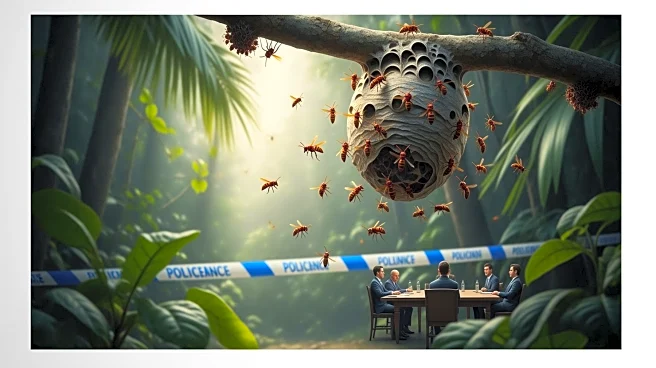What's Happening?
An American father and son, Daniel Owen and his son Cooper, tragically died after being attacked by a swarm of giant Asian hornets while ziplining in Laos. The incident occurred at Green Jungle Park, where
the pair were stung over 100 times. The attack happened as they descended from a tree with a ziplining guide. Despite being rushed to a local clinic and then transferred to a provincial hospital, both succumbed to their injuries. Daniel Owen was the director of QSI International School of Haiphong in Vietnam, where he had dedicated 18 years to education. The U.S. Department of State confirmed the deaths but withheld further comments out of respect for the family's privacy.
Why It's Important?
The incident highlights the dangers posed by giant Asian hornets, also known as 'murder hornets,' which are known for their aggressive behavior and ability to destroy honey bee hives rapidly. This tragedy underscores the potential risks for tourists engaging in outdoor activities in regions where these hornets are prevalent. The deaths of the Owen family members also bring attention to the need for increased awareness and safety measures in adventure tourism, particularly in areas where dangerous wildlife is present. The loss is felt deeply within the educational community, where Daniel Owen was a respected leader.
What's Next?
In response to this incident, there may be calls for enhanced safety protocols in adventure parks and tourist destinations in Southeast Asia. The local authorities and tourism operators might review and possibly revise their emergency response strategies to better handle such wildlife encounters. Additionally, the educational community may hold memorials or tributes to honor Daniel Owen's contributions and legacy.
Beyond the Headlines
The presence of giant Asian hornets in the U.S., particularly in Washington State, has been a concern since they were first spotted in 2020. Efforts to control their spread are ongoing, as they pose a significant threat to local ecosystems and agriculture, particularly the honey bee population. This incident may renew focus on these efforts and the importance of monitoring invasive species.








